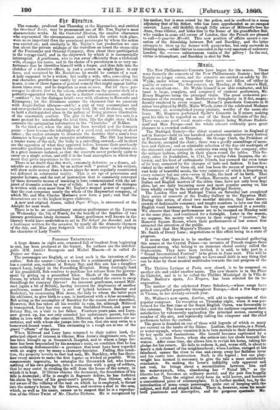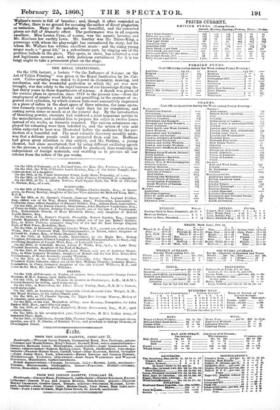31/niir.
The New Philluirmonic•Concerts have begun. for the season. These' were formerly the concerts of the New Philharmonic Society ; but that Society no longer exists, and. the concerts are carried on solely by Dr. Wylder under whose management they have not fallen off either in quality or success. The first concert, on Monday, at St. James's Hull, was an. excellenb one. Dr. Wylde himself is an able conductor, and his band is large, complete, and composed of eminent performers, Mr. Henry Blagrove being the principal violin. The great orchestral per- formance of the evening was Beethovens Symphony in B fbat, magni- ficently rendered in every respect. Mozart's pianoforte Concerto in G: minor tens played' by Mdlle. Marie Wieelr, sister of the celebrated Madame Schumann, an accomplished young pianiste, worthy of the name she bears Mr. Blagrove performed Spohr's Caneerto in B minor, making, good Iris title to be regarded as one of the finest violinists of the day-. There was some good vocal music—the singers being Madame Riders- dorff and Miss Parepa—and the. whole concert evidently gave great pleasure to a crowded audienoe. The Madrigal Society—the oldest musical association in, England if act in Europe—held itirone hundred and nineteenth anniversary festival at Freemasons' Hall' on Thursday. Sir George Clerk, the President of the Society, occupied the chair ; there- was a goodly assemblage of mem- bers and visitors ; and an admirable selection of the fine old madrigals of- the sixteenth and seventeenth, centuries was sung by the company, after the antique fashion, sitting in their places round the tables. This So- ciety, since its foundation, in 1741, by worthy John- Imnryns, the at- torney, and his knot of enthusiastic friends, has pursued the even tenor of its way, unmoved by the changes of taste and fashion. It has. florae rished lathe midst of them all, and has, been the means of preserving a vast body of beautiful music, the very existence of which is forgotten. in every country but our own—even in Italy, the land of its birth. That the.werks of Wilbye, Morley, Weelkes Marenzio, and a host of great 'Malian and English masters of the olden time, have not only-been kept alive, but are daily becoming more and more popular among us, has been wholly owing to the labours of the Madrigal Society. The London Glee and Madrigal Union on Saturday last completed' their series of concerts at the Dudley Gallery in the Egyptian Hall! During this- series; of about two months' duration, they have drawn crowds of fashionable company, and taught numbers to love our fine old. English vocal harmony; to whom its. very age rendered it a novelty. We observe-that- theseperfbrmaneee are to be resumed on Monday next at the same place, and continued for a fortnight. Later in the season, we suppose, the, society will return to their Original "location," the Hanover Square Rooms, where their performances of last season first attracted the-attention of the public.
It is said that Her Majestyli.Theatre will be opened this season by, Mr. Smith of Drury Lane.; negotiationa to this effect being in a state of Progress. It seems that there is to be another "monster" musical gathering, this season at the Crystal Palace—an invasion of French singers three thouaandsteong, who belong to an immense choral society called the Orpheonists. They have been invited, it is said, to tae part in a "Grand International Festival" to be given in June next. This will be something curious at least; though we have small faith in any thing that can be done by these musical multitudes towards the real progress of the art.
The Theatre Lyrique at Paris, now closed, is to be reopened on another site and under another name. The new theatre is in the Place ' du Chatelet, and ia to be called' the Theatre Municipal de la Ville de Paris. Berlinz's apera, Les. Zwyens, has been selected for its in- auguration:
The mother of the- celebrated Franz Sehubere—whose songs have gained unequalled popularity throughout Europe,—died a- few days ago at Vienna, in her seventy-seventh year.
Mr. Wallace's new opera, Lurline, will add to the reputation of this popular composer. Its reception on Thursday night, when it %vesper- formed for the first time at the Royal Etiglish Opera, was favourable in the extreme. The house was crowded ; and- the audience expressed their satisfaction by vehemently applauding the principal scenes, encoring a number of the airs, and repeatedly calling the composer and the chief performers before the curtain.
The.piece is founded, on one of those wild legends of which so many are current on the banks of the Rhine. Lurline, the heroine, is.a Naiad, or water-nymph, whose vocation it is:to lure-mortals to their destruction by her spells and. fascinations. She herself becomes captivated by a mortal, a certain Baron, whom she entices into her abode beneath the waters.. After some time, she allows him.to revisit his home, taking his pledge for his return.. He fails-to redeem it, and, worse still, is about to many a. rich damsel of the neighbourhood; when Lurline, enraged at his falsehood, causes the. river, to rise and sweep away her faithless lover and his castle into destruction. Such is the legend ; but our play,- wright has deemed it. necessary to give the tale a more satisfactory conclusion. Se. making the lover's infidelity only apparent and. not real; he brings about a seconciliation between him and his water-nymph, who,, abandoning her " Naiad life,"- as the libretto has it, becomes an ordinary mortal, and' the pair live happily aver after. Thus the original story loses its wild horror, and becomes st, conventional piece of commonplace, It is further-spoiled, too,, by the intmduction of some- comic personages, quite out, of keeping with the' subject, and dull' and stupid. withal. There is, however, room for music both passionate and descriptive, and for gorgeous spectacle. Mr: Wallace's musio ia full of beauties ; and, though it often reminded us of Weber, there is no ground for accusing the author of direct' plagiarism. or imitation. Many of the melodies are beautiful, and the concerted pieces are full of dramatic effect. The performance was in all respects excellent. Miss Louisa Pyne, of course, was the aquatic heroine, and Mr. Harrison her earthly lover. Mr. Bentley was the Rhine-King, a personage with whom the playwright has encumbered the story, but for whom Mr. Wallace has written excellent music : and the rising young singer made a " great hit," in a subordinate part, by singing one of the prettiest ballads in the piece. This opera, in short, has achieved a real and legitimate success ; and, with judicious curtailment (for it is too long) ought to take a permanent place on the stage.



























 Previous page
Previous page